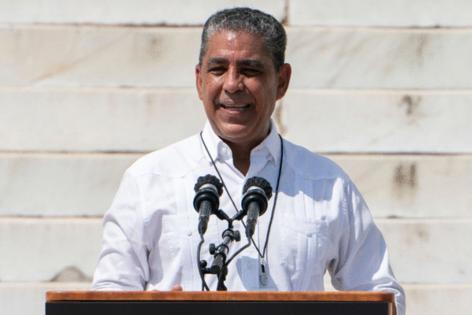Outside groups call on Congress to buck the trend and invest in itself
Published in News & Features
WASHINGTON — Hill watchers, oversight wonks and good-governance types descended on a Rayburn House Office Building hearing room Wednesday with a wish list of spending items for the legislative branch.
It was the first public witness day for the House Legislative Branch Appropriations Subcommittee in years, and they came bearing a variety of proposals to make Congress stronger, from investing in modernization, to stepping up transparency, to maintaining a Library of Congress program for the blind.
“The subcommittee needs to hear the concerns of our constituencies, and members of the public before us will provide that kind of input,” said Rep. Adriano Espaillat, ranking member of the subcommittee.
“It’s great to see some familiar faces on the witness list. We have made progress over the years regarding many of your past requests to improve the operations of the leg branch. Your presence today means we have a lot more work to do,” the New York Democrat added.
The hearing came after a coalition of groups — some of which showed up on Wednesday — sent a letter calling on Espaillat and Chair David Valadao, R-Calif., to reinstate the tradition of inviting members of the public to testify in person.
According to the coalition, the last time the House Legislative Branch Appropriations Subcommittee held a public witness day with live testimony was just before the onset of the pandemic in 2020. This latest one comes as the subcommittee is launching into a series of annual budget hearings. In the last week, it has heard fiscal 2026 funding requests from the Capitol Police, the Architect of the Capitol, the Library of Congress and several other entities.
Wednesday’s “nerd convention” — as one witness affectionately called it before the start — featured the kinds of people who frequent House Administration Committee hearings and care about the operations side of Congress, from groups like POPVOX Foundation, the Bipartisan Policy Center and the American Governance Institute.
It was also an opportunity for members of the House to address the committee, though only one, Texas Democratic Rep. Sylvia Garcia, submitted written testimony. Garcia called for language that would allow recipients of the Deferred Action for Childhood Arrivals program to work in the federal government. She also asked Republicans to reopen a House diversity office they shuttered.
Of those testifying in person, many made pitches for Congress to invest in itself, a tall order at a time of deep cuts across the federal government. The subcommittee members in attendance listened patiently, without asking a single question.
“As both a political scientist and someone with experience as a staffer, I can confidently say that I know Congress can best execute its Article 1 responsibilities only when it adequately invests in its own capacity,” said J.D. Rackey, a senior policy analyst at the Bipartisan Policy Center and a former staffer on the Select Committee on the Modernization of Congress, or ModCom.
Rackey urged the panel to restore a $10 million funding level for the Modernization Initiatives Account in fiscal 2026. The account helps pay for efforts proposed by the now-defunct ModCom and its current successor, the House Administration Modernization and Innovation Subcommittee, but the level was reduced in the stopgap spending measure that Congress passed last month.
“The American people rightly demand efficiency and effectiveness from their government. However, it is important to remember that efficiency can be gained both from reducing spending and through strategic investment,” Rackey said.
Danielle Stewart, adviser for congressional initiatives at POPVOX and a former Hill chief of staff, called on lawmakers to examine the feasibility of a House Casework Support Office that could serve as a central hub. Congressional staff are dealing with a spike in complex requests from constituents since President Donald Trump took office and began slashing executive agencies.
She also made the case for the Congress to invest in remote voting, a timely issue given that the House put the kibosh on a push to allow proxy voting for new parents a day earlier.
“This effort is not about excusing absences. It’s about ensuring continuity of operations during emergencies or when in-person gatherings become impossible,” Stewart said. “Other major legislatures, including Canada and the U.K., have implemented secure remote voting options for their members. As national security threats evolve, Congress must maintain its ability to vote and exercise its Article 1 responsibilities.”
Some proposals had less to do with boosting funding and more to do with changing the culture on Capitol Hill.
James Townsend, a former Michigan state legislator and director of the Levin Center for Oversight and Democracy at Wayne State University, argued that striving for bipartisan harmony could actually save Congress money.
Creating bipartisan committee websites and authoring bipartisan reports, as well as hiring certain administrative staff on a bipartisan basis, would be simple ways of saving taxpayer dollars and making Congress more efficient, Townsend said.
“Really good oversight and fact-finding work is done on a bipartisan basis because you get a greater breadth of information,” said Townsend. “You get viewpoints coming from different sides, all in pursuit of the facts and trying to reach some consensus on how to move forward.”
_____
©2025 CQ-Roll Call, Inc., All Rights Reserved. Visit cqrollcall.com. Distributed by Tribune Content Agency, LLC.







Comments